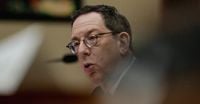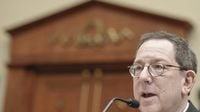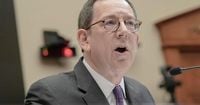On September 4, 2025, Northwestern University President Michael Schill announced his resignation, capping a turbulent three-year tenure that saw the prestigious Illinois institution thrust into the crosshairs of national political debates, campus unrest, and a dramatic freeze on federal funding. Schill’s decision, revealed in a letter to students and faculty, comes at a moment when Northwestern is grappling with both internal and external challenges—ranging from allegations of antisemitism, pro-Palestinian protests, and high-profile lawsuits, to the existential threat posed by the Trump administration’s freeze of nearly $800 million in federal grants.
“As I reflect on the progress we have made and what lies ahead, I believe now is the right time for new leadership to guide Northwestern into its next chapter,” Schill wrote, according to ABC7 Chicago. He added, “I also recognize that difficult problems remain, particularly at the federal level. It is critical that we continue to protect the University’s research mission and excellence while preserving academic freedom, integrity, and independence.” Schill will stay on until an interim president is named, after which he plans to return to the Northwestern Pritzker School of Law as a faculty member to teach and conduct research.
The backdrop to Schill’s resignation is a climate of mounting political scrutiny and financial uncertainty. As reported by the Associated Press, the Trump administration froze $790 million in federal funding for Northwestern in April 2024, as part of a broader investigation into elite universities accused of failing to adequately protect Jewish students from antisemitism. The freeze has had immediate and severe consequences: Northwestern laid off around 200 staff members over the summer of 2025, and the research community has felt the pinch acutely. “This has been affecting the campus, both campuses, and it's been really impactful on all of our research progress; and just as a graduate student, it's been really challenging to try to keep pushing projects forward when there's no funding to be able to do that anymore,” said PhD student Jack Sumner, according to coverage in the Chicago Tribune.
Northwestern’s predicament is hardly unique. The university is one of several elite institutions—including Harvard and Columbia—under federal investigation for their handling of campus protests and allegations of antisemitism in the wake of the October 7, 2023, Hamas attack on Israel and the subsequent Israeli military operations in Gaza. The Department of Education cited Title VI of the Civil Rights Act, which bars discrimination based on national origin at federally funded schools, as the legal basis for these probes. President Trump has repeatedly derided such campuses as “hotbeds of liberalism and antisemitism,” fueling an already polarized national debate.
Schill’s own handling of campus unrest became a lightning rod for criticism from both sides of the political aisle. In spring 2024, as pro-Palestinian encampments sprang up on campuses nationwide, Northwestern struck an agreement with demonstrators to remove their encampment in exchange for reestablishing an advisory committee on university investments and making other commitments. According to Schill, “We had to get the encampment down. The police solution was not going to be available to us to keep people safe, and also may not be the wisest solution as we’ve seen at other campuses across the country.” He defended the university’s approach during a May 2024 appearance before the House Committee on Education and the Workforce, arguing that negotiating with protesters allowed Northwestern to defuse the situation peacefully without conceding to demands to sever business ties with Israel or end academic programs focused on Israeli innovation.
But not everyone was satisfied. Committee chair Rep. Virginia Foxx, a Republican from North Carolina, lambasted Schill and the presidents of Rutgers and UCLA for what she called “disgraceful deals” with demonstrators whose views she labeled as antisemitic. “Mr. Schill, you cut a disgraceful deal with the encampment that prompted seven Jewish members of your own antisemitism advisory committee to resign in protest,” Foxx said during the hearing, as reported by the Chicago Tribune. Schill, who is himself a Jewish descendant of Holocaust survivors, pushed back, emphasizing the need to balance campus safety, academic freedom, and the rights of students to protest.
The protests and their aftermath also sparked legal action. In the weeks preceding Schill’s Congressional testimony, three Northwestern students filed a lawsuit against the university, alleging that administrators had enabled harassment by pro-Palestinian protesters. The university, for its part, denied any wrongdoing and maintained that its actions were consistent with its values and obligations to all students.
Meanwhile, the funding freeze’s ripple effects have continued to sow anxiety and uncertainty, particularly among graduate students and research faculty. “Funding cuts have definitely been an anxiety that I have had. And I imagine that a lot of people that have been here longer have also felt, and I imagine that with these cuts, if there was a lot of … displeasure with the fact that people are not secure in their funding, especially for PhD students, that that would have been a significant reason as to why they could have resigned,” said PhD student Mekhi Williams.
Faculty, too, have voiced their concerns. Last month, a group of Northwestern professors—calling themselves the Northwestern Concerned Faculty Group—sent a letter to university leadership urging them not to “make a deal” with the Trump administration to unfreeze the funds. “We call on Northwestern's leadership to resist the administration's attack on fundamental democratic principles by refusing to 'make a deal' with the administration,” the letter read. “Acquiescence to the administration's tactics would make Northwestern complicit in an assault on higher education, which is an essential bulwark of civil society.”
Schill’s tenure was also marked by challenges unrelated to the protests or federal funding. Shortly after he took office in August 2022, Northwestern became embroiled in a hazing scandal involving its football team. Multiple lawsuits alleged sexual abuse and racial discrimination, leading to the suspension and eventual firing of coach Pat Fitzgerald. The university concluded that Fitzgerald bore responsibility for failing to stop the hazing. Fitzgerald denied wrongdoing, and the matter was settled last month with a payout and restoration of some federal grants.
Through it all, Schill has maintained that his primary goal was to safeguard the university’s core missions of research, teaching, and academic freedom. “It has been my privilege to work alongside extraordinary colleagues and to witness firsthand the resilience, generosity, and strength of the Northwestern community,” he said in his resignation letter.
As Northwestern enters a period of transition, the search for new leadership comes amid ongoing negotiations with the Board of Trustees and federal agencies to restore the university’s frozen funding. Schill has pledged to work closely with the board during this process, even as he prepares to return to academia. The stakes, both financial and reputational, are high—not just for Northwestern, but for the broader landscape of American higher education, where questions of free speech, campus safety, and the boundaries of protest are being debated as never before.
For the students, faculty, and staff whose daily lives have been shaped by these extraordinary events, the hope is that Northwestern’s next chapter will be one of renewal, stability, and continued academic excellence—no matter how stormy the political climate may remain.



